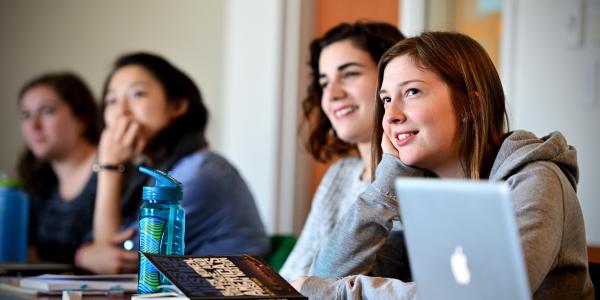Seven teaching-track and practice-track faculty members will receive funding to develop innovative pedagogical techniques as part of a new award program in Arts & Sciences.
The recipients of the inaugural Arts & Sciences Teaching Innovation Awards are Rong Chen, senior lecturer in chemistry; Carol Jenkins and Katherine Kerschen, lecturers in German; Silas Johnson, lecturer in mathematics; Deirdre Maitre, senior lecturer in film and media studies; David Marchant, professor of practice in dance; and Mungai Mutonya, teaching professor in African and African American studies.
The competitive awards program provides grants of up to $5,000 to faculty members with creative ideas for expanding their teaching in ways that enhance the academic community. A committee of three vice deans and two appointed teaching professors evaluated the proposals and selected this year’s recipients.
“Our teaching-track faculty are doing amazing things and constantly striving to improve our students’ experience in so many ways,” said Andrew Brown, vice dean of faculty affairs. “I’m looking forward to watching these projects develop over the coming year and beyond, and I’m very excited to read the next group of applications and to see the many ways our teaching track faculty will continue to make an extraordinary impact on our students.”
The next round of applications will be due Feb. 14, 2025.
Learn about the 2024 awardees and their projects:

Rong Chen
“Exploring Online Homework with Adaptive-Response Feedbacks”
Chen aims to pilot a customized online homework system with adaptive and individualized learning for Organic Chemistry I & II. The system will support the Ready to React (R2R) program for students at risk of academic failure. Under Chen’s proposal, students participating in R2R will gain access to the system in the Fall 2024 and Spring 2025 semesters. “We expect the personalized approach offered by this online homework will greatly enrich the learning experience, increase engagement with course materials, and promote inclusivity within the class,” Chen wrote.
Carol Jenkins and Katherine Kerschen

“Integrating an Inclusive and Justice-oriented Mindset into Language Pedagogy”
Jenkins and Kerschen will educate and train themselves on inclusive and social justice-oriented pedagogical reforms. Their proposal calls for deep research, travel to workshops, and consultation with experts to create new teaching materials, new learning objectives for the curriculum in German, and a framework for integrating an inclusive, justice-oriented approach into new and existing courses. They plan to work with the Center for Teaching and Learning and the Faculty Fellow for Inclusive Pedagogies in the Office of the Provost to coordinate programming aimed at language instructors across departments.
Silas Johnson

“Alternative Grading in Calculus”
Johnson’s project seeks to implement alternative grading structures in lower-division math courses, using Math 131 as a pilot. Johnson will choose or design a grading structure for the Spring 2025 course, which normally enrolls around 70 students. “Course grades should reflect learning and fluency in material, not just the performance on a few exams,” he said. “I'm excited by the enthusiastic community of instructors in the math department and beyond who are interested in innovations to improve our pedagogy.”
Deirdre Maitre
“Hap|Ography”
This grant was funded by the Center for the Literary Arts, a signature initiative of the Arts & Sciences Strategic Plan.

Maitre first conceived of the Hap|Ography project — a unique, interdisciplinary film and media project — in the spring of 2023. Students were guided to visually answer the open-ended question “What is happiness?” by observing and capturing vertical video that documents happiness from the subjective vantage point of the student filmmaker. As an instructor, Maitre helps students immerse themselves in small, engaged groups that cultivate cooperative working styles and artistic curiosity. “I’m delighted and grateful to be the recipient of this year’s Teaching Innovation Award in creative practice and pedagogy,” she said. “A very special thanks to Arts & Sciences and the Center for the Literary Arts for supporting my vision.”
“We are thrilled to be able to support such an original teaching project that connects — in truly innovative ways — creative practice with digital technology and social media,” said Ignacio Infante, CLA co-director and an associate professor of comparative literature and Spanish.

David Marchant
“Dance in 360 Immersive Video and VR”
Marchant aims to explore the use of 360-degree video and immersive virtual reality technologies to expand the field of dance pedagogy, composition, and dance video art. “My approach to teaching dance and performance has for many years been interested in interactive environments that create immersive experiences for both dancers and audiences alike,” he said. “The generosity of the Teaching Innovation Awards will allow me to explore new technologies and emerging mediums for the creation, presentation, and viewing of dance.”
Mungai Mutonya
“African Immigrants in Nairobi and St. Louis”

Mutonya seeks to leverage language mapping and archival resources to enrich Swahili and African linguistics courses. His project will expand on a long-term language mapping project centered around Swahili and African immigrants. The Teaching Innovation Award will allow him to revise or create a course on fieldwork methodologies, with students recording oral histories from Swahili-speaking African American and African immigrant communities in St. Louis. Students at WashU and the University of Nairobi will explore connections between Swahili, eastern Africa, and local institutions such as Hadley Technical High School, Vashon High School, and the Homer G. Phillips Memorial Hospital. “Thanks to this A&S award, I’ll be able to shift my emphasis to the St. Louis community,” he said.





